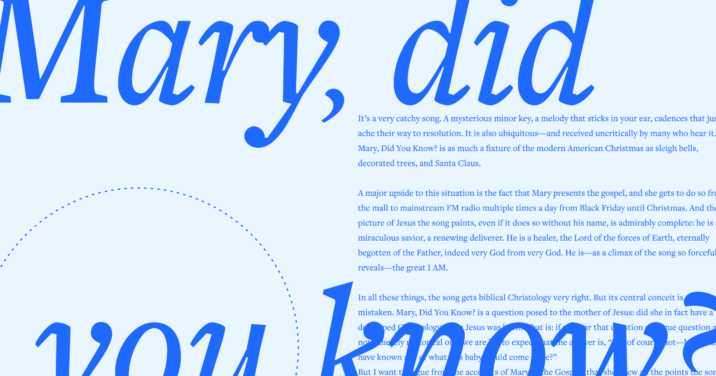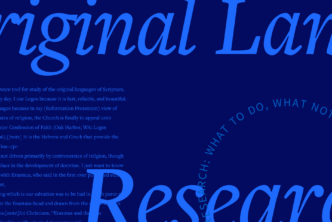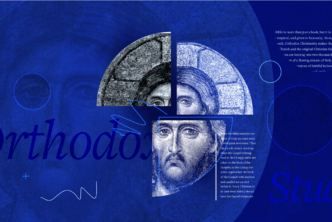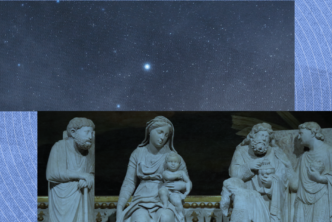It’s a very catchy song. A mysterious minor key, a melody that sticks in your ear, cadences that just ache their way to resolution. It is also ubiquitous—and received uncritically by many who hear it. “Mary, Did You Know?” is as much a fixture of the modern American Christmas as sleigh bells, decorated trees, and Santa Claus.
What the song gets right
A major upside to this situation is the fact that Mary presents the gospel, and she gets to do so from the mall to mainstream FM radio multiple times a day from Black Friday until Christmas. And the picture of Jesus the song paints, even if it does so without his name, is admirably complete: he is a miraculous Savior, a renewing deliverer. He is a healer, the Lord of the forces of earth, eternally begotten of the Father, indeed very God from very God. He is—as a climax of the song so forcefully reveals—the great I AM.
In all these things, the song gets biblical Christology very right. But its central conceit is, I think, mistaken.
What the song gets wrong
“Mary, Did You Know?” is a question posed to the mother of Jesus: Did she in fact have a developed Christology when Jesus was born? That is, if we hear that question as a true question and not a merely rhetorical one, we are led to expect that the answer is, “No, of course not—how could I have known any of what this baby would come to be?”
But I want to argue from the accounts of Mary in the Gospels that she knew all the points the song reveals, and probably quite a bit more. Consider what she demonstrated in thought, word, and deed about just how much she knew of this plan of God’s she submitted herself to. Consider, too, that she knew all of this because she knew the Scriptures inside out.
Almost all of what we know of Mary around the time of Jesus’s conception and birth comes from Luke’s Gospel. In his first two chapters, Luke relates several stories about things Mary heard, thought, said, and did. And an exploration of these items reveals that by the time the prophetess Anna began to give thanks to God and to speak of Jesus to all who were waiting for the redemption of Jerusalem, Mary knew every last bit of what our song asks.
“Mary, did you know that your baby boy would one day walk on water?”
Matthew tells us that when Joseph found out his betrothed was expecting, he knew the child couldn’t be his. He decided to quietly end the marriage, but was stopped by a visit from an angel of the Lord. The messenger told him that the child Mary carried was from the Holy Spirit, that Isaiah’s prophecy of Immanuel was being fulfilled through him, and that Joseph should call his name Jesus. The significance of the name “Immanuel” is explained: Matthew translates for us that this name means “God with us.”
But the name “Jesus” is somewhat lost on most English speakers today. “Jesus” is an anglicization of the Latin Iesus, which in turn is taken from the Greek Iesous, which again is taken from the Hebrew Yehoshua. This last word is the key, but it is also lost on us poor English speakers. Yehoshua, transliterated down to us in a slightly different way, is the name “Joshua.” We remember Joshua, of course, as the Israelite who worked under Moses during the Exodus, who walked across through the waters of where the Red Sea had been, and who finally led the Israelites into the Promised Land after their wandering. In Matthew’s Gospel, then, we find God’s messenger telling Joseph that Mary’s son is God-With-Us, a new Joshua who will lead his people across the waters and into the true Promised Land.
We can assume that Joseph told Mary about this vision. We know from Luke that the angel Gabriel gave Mary a personal revelation of the name. And we know they did in fact name the baby “Jesus.” Further, Mary knew to identify Jesus with God. This child whose name was also to be “Immanuel” meant that God himself had come to visit his people Israel. With this identity in mind, when Mary sang the end of Psalm 77 in her prayers, she would have understood that this new Joshua was one with the one addressed at the end of the Psalm:
Your way was through the sea,
your path through the great waters;
yet your footprints were unseen.
(Ps 77:19)
Mary knew he would walk on water.
“Mary, did you know that your baby boy would save our sons and daughters?”
Yes, Yehoshua means “God will save,” so Mary knew from that clue alone that Jesus would save his people. But Mary knew this in ways far deeper than name etymology. Luke tells us that when Gabriel visited Mary, he told her that Jesus “will be great and will be called the Son of the Most High.” The angel said, too,
The Lord God will give to him the throne of his father David, and he will reign over the house of Jacob forever, and of his kingdom there will be no end. (Luke 1:32–33)
These words of Gabriel’s must have been nothing short of stunning to Mary. Israel had long hoped for the restoration of David’s throne. Israel believed that only YHWH could bring that about, and that when he came back to re-inhabit his place in the Holy of Holies in the Temple, he would restore the kingdom, setting Israel free from her oppression and effecting his wider salvation through them to the whole world.
It is clear from her Magnificat (Luke 1:46–55) that Mary knew all about all of this, and to have an angel of the Lord arrive to her to tell her that the fullness of time had come must have been completely astounding. To hear that all this was to be brought about through her own womb must have further turned up the shock dial. God’s long-promised, long-awaited salvation was on its way—on his way—and he was coming into the world through her.
Gabriel confirmed God’s returning presence when he explained how this all was to come about.
The Holy Spirit will come upon you, and the power of the Most High will overshadow you. (Luke 1:35)
Mary knew from Scripture that God “overshadowed” the tabernacle when he entered it, and she also knew that when God was with Israel, Israel was delivered from its enemies. Mary knew, literally in the core of her being, that Jesus would save our sons and daughters.
“Mary, did you know that your baby boy has come to make you new? This child that you delivered, would soon deliver you?”
Christians in the Roman Catholic tradition may argue that Mary did not know that the child she delivered would soon deliver her, on account that Mary did not need saving like the rest of us. In 1854, Pope Pius IX defined the Immaculate Conception, the teaching that Mary was exempt from the stain of original sin from the moment of her conception in view of the future merits of Christ (i.e., Mary received an “advance” on Christ’s salvific work on the cross), as an official Catholic dogma.
Most Christians, however, including the Orthodox, do not hold to the doctrine of the Immaculate Conception. Orthodox Christians believe Mary was exceptionally holy, but she acquired her sanctity over the course of her life, in much the same manner as the rest of us do: through obedience to God by faith, not through the circumstances of her biological conception. Orthodox and Protestants (with the exception of some Anglo-Catholics) agree that Mary identified Jesus as both her son and her Savior, and herself as his mother as well as his servant and disciple. She looked to him for her own salvation as well as the salvation of the world.
But the doctrine of the Immaculate Conception aside, it is clear in the Gospels that Mary was well aware of the deliverance from sin that she had already received. Gabriel greeted her by saying, “Rejoice, you on whom God has bestowed high favor!” (Luke 1:28). She was understandably nervous, so he continued: “Do not fear, Mary, for you have found favor with God” (Luke 1:30).
As Mary soon learned, she had found so much favor with God that she was to be the mother of the Son of the Most High. This type of favor is not like someone favoring one sports team over another or preferring the red M&Ms to the blue ones. This favor that Gabriel announced, this favor that God had bestowed on Mary—this was the same favor Noah found, the same favor Job found, the blamelessness before God that is noted so rarely in Scripture, but so powerfully when it is found. Having seen this vision, and then somewhat later having felt this Son moving in her womb, she must have been as certain as any person has ever been of anything that her deliverance—and all of the fulfilled Israel’s with her—was accomplished. As she sang with Elizabeth, “My soul magnifies the Lord, and my spirit rejoices in God my Savior, for he has looked with favor on his maidservant, and behold, from henceforth all generations shall call me blessed” (Luke 1:46–47).
If Mary didn’t know that Jesus would deliver her, it was only because she was certain he already had.
“Mary, did you know that your baby boy would give sight to a blind man?”
When John the Baptist had an apparent lapse of faith while in prison, he sent messengers to Jesus to ask if he was indeed the Christ, the Messiah promised by the Old Testament. Jesus, in his usual way, refrained from giving the yes-or-no answer, but instead referred John’s disciples to the witness of their own eyes and ears, that what Isaiah had foretold was being fulfilled through Jesus right in front of them. Reminding Israel that, even though slavery and oppression were to come, Isaiah said, “it is not yet a very little while” until God would restore them, and “in that day, the deaf shall hear the words of a book, and out of their gloom and darkness, the eyes of the blind man shall see” (Isa 29:17–18). Mary demonstrated in her fiat to Gabriel and her conversations with Elizabeth that she knew the Scriptures deeply. Especially having Isaiah’s prophecies already called to mind by Joseph’s vision, she could not have missed that Jesus would bring about all the things Isaiah had foretold for “that day.” Mary knew Jesus would give sight to the blind.
“Mary, did you know that your baby boy would calm the storm with his hand? When you kiss your little baby, you kiss the face of God?”
Mary’s deep familiarity with Scripture would mean she knew the Psalms well. By the time she had spoken with Gabriel, heard from Joseph of his own angelic encounter, found out from Zachariah and Elizabeth all the things that had happened in the Judean hill country, met the shepherds with their tales of angelic hymnody, and heard the wonder in the voices of Simeon and Anna at the Temple, Mary would have long since made the connection that this Jesus she bore was the Messiah spoken of so often in the Prophets and the Writings.
How quickly then, when she sang Psalm 107, must it not have been apparent to her that the Savior of the sailors caught in a storm (who “staggered like drunken men … at their wits’ end”), the Savior to whom they “cried in their trouble … and [who] made the storm be still, and the waves of the sea hushed,” was the Savior she delivered in Bethlehem? It also might have been through Psalm 107 that she made the final jump. Jesus was the one who calmed that storm for the staggered sailors the psalmist sang of. She would have sung that psalm, and it would have clicked. But so much more would have fallen into place. The one who brings calm to the storm is the one who brings order to the chaos of the sea, the one whose Spirit hovered over the waters and whose breath created.
All of this would have been very obvious to Mary—because of a connection she must have made by then, but that we will save for later here.
“The blind will see, the deaf will hear, the dead will live again. The lame will leap, the dumb will speak, the praises of the Lamb.”
We have already seen that Mary would have known about eyes and ears being opened. Likewise, Isaiah proclaimed that in “that day,” the lame man would leap like a deer. Mary saw firsthand how spiritual deafness and blindness had led Zachariah to literal dumbness. She couldn’t have avoided hearing, then, that at John’s birth, Zachariah’s tongue was loosed, and he immediately began to echo Isaiah about the way of the Lord being made straight, and she knew full well who John and Jesus were. Zachariah had already sung the praises of Jesus before Jesus was born, and Mary would have known Jesus to be the lamb, for by then, and especially after meeting Simeon, she must have understood that Jesus was Isaiah’s Suffering Servant, who would be led like a lamb to the slaughter in his delivering act.
“Mary, did you know that your baby boy was Lord of all creation, would one day rule the nations, was heaven’s perfect Lamb, that your baby boy is the great I AM?”
Mary had identified Jesus with the restoration of David’s throne through Gabriel’s message, and the Magnificat shows us that she had understood that it was in Jesus that God was raising his mighty arm to throw down the mighty. Taken together, the witness of the Prophets is unequivocally eschatological. Their visions coalesced into much more than a provincial notion of the Israelites finally coming to dwell peacefully in their own little corner of the world. Instead, the prophets demonstrated that the God of Abraham, Isaac, and Jacob was not the local deity on Mount Zion, but was rather the Creator of all that is, seen and unseen. As John says in his prologue, he was the Word through which all things were made.
Mary would have understood that Jesus was the Word, and she would have understood that it is through God’s Word that chaos is made into order, that when the Spirit of God was hovering over the primordial deep, that when God spoke light into being, it was the Word he spoke which effected the light. And it was that same Word which was born to her in Bethlehem. The God who created the cosmos, the God of whom the psalmist said, “the earth is Yahweh’s, and all its fullness” (Ps 24), had somehow come to be born to her in a stable, wrapped in swaddling clothes and laid in a manger as true food for the world. And when she treasured all these things in her heart, her heart must have burned with a fire that gave her light and life but did not consume her, just as God did not consume the bush when he revealed himself to Moses. And by the light of that fire, she would have clearly seen, lying in her arms, the great I AM.







